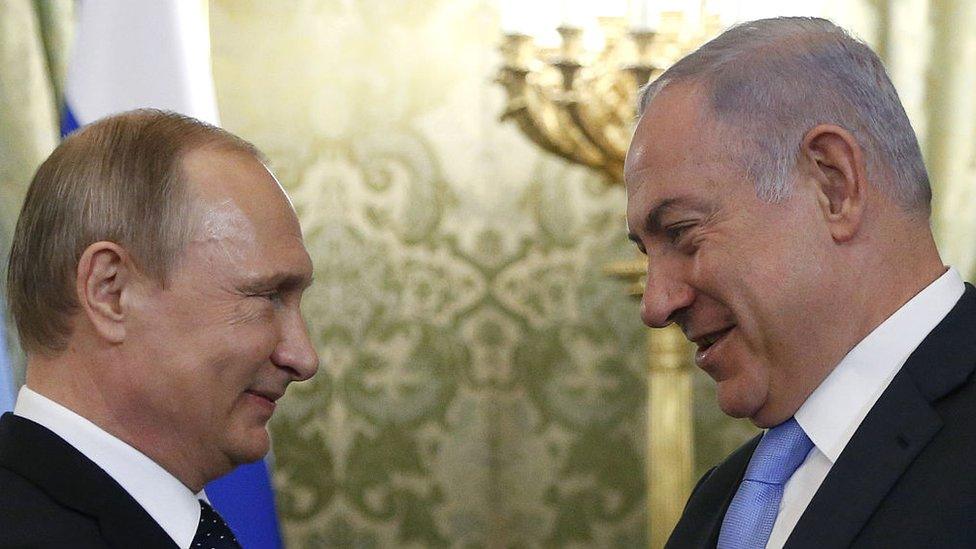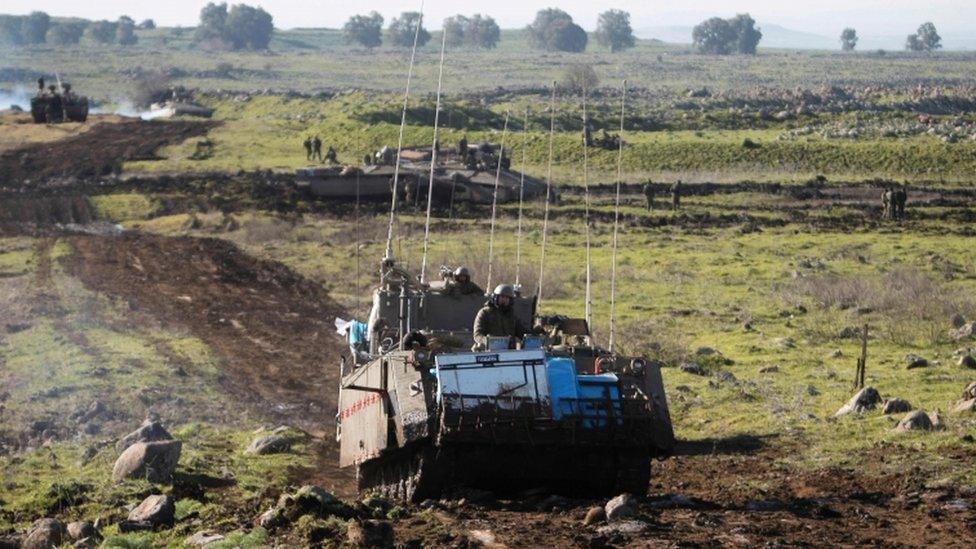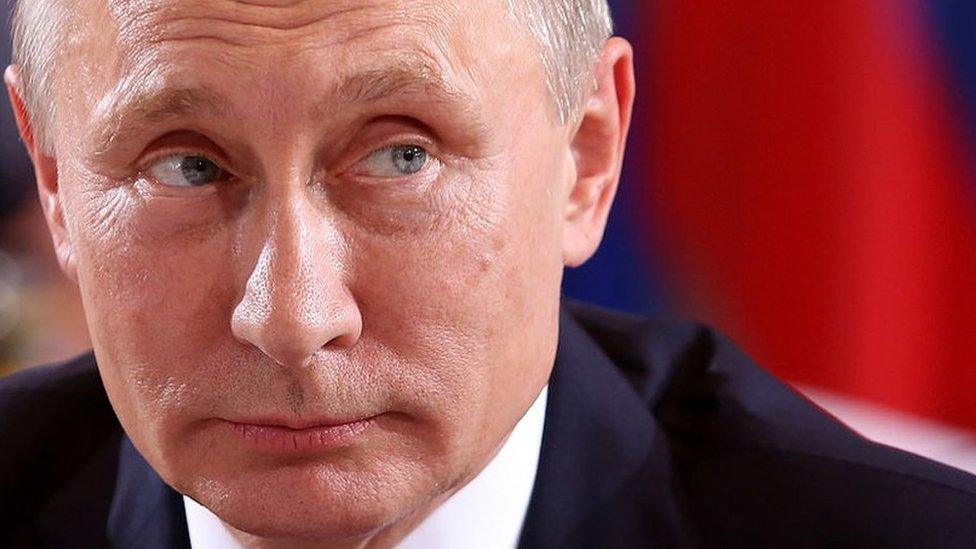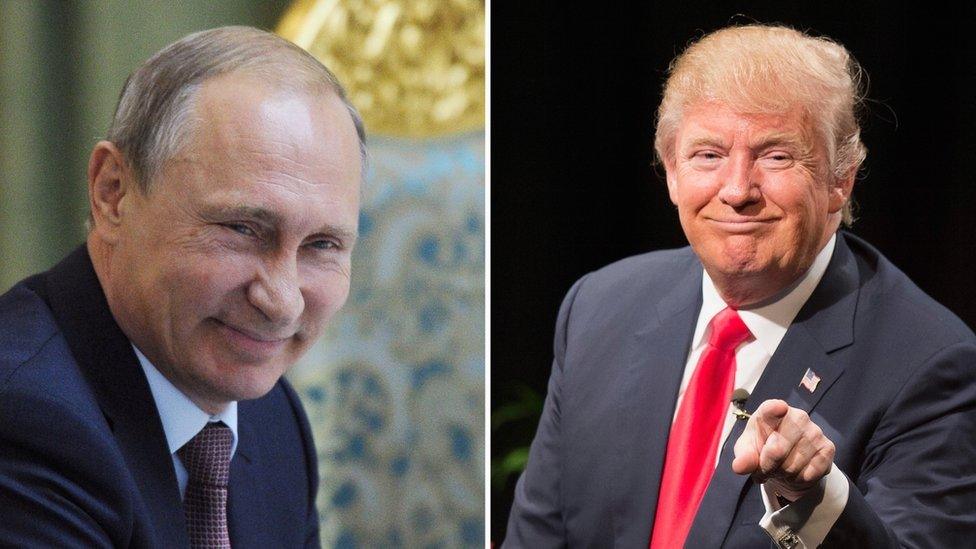Putin and Netanyahu: A complex diplomatic dance
- Published

Vladimir Putin and Benjamin Netanyahu
Israeli Prime Minister Benjamin Netanyahu's visit to Moscow on Thursday shows how Russia is now more important than ever in the Jewish state's strategic calculations.
Russia's direct intervention in the Syrian war has consolidated President Bashar al-Assad's position and ensured that regime change will not happen any time soon. It has also transformed the tactical environment in which the Israeli Air Force operates.
Russian combat patrols and sophisticated radars and air defences potentially limit Israel's freedom of action in the airspace over Syria.
So Mr Netanyahu and the Russian president have much to discuss. Indeed they have frequent meetings - Mr Netanyahu rushed off to Moscow soon after the Russian military intervention in Syria was announced in 2015, and he was back there again last April. The regularity of these contacts underscores the importance of this "odd-couple" in Middle Eastern diplomacy.
Of course, Moscow's view of the Middle East has always mattered to Israel. Russia remains a permanent member of the UN Security Council. It has been the chief military backer of key regional players like Syria.


And it is of course the original home of hundreds of thousands of Israeli citizens who emigrated there from the Soviet Union. Many of them retain strong ties to Russia.
Russia has, for the time being, supplanted the United States as a key player in crisis management in Syria (accepting that direct intervention in a war is a "generous" interpretation of the phrase "crisis management").
Moscow has signalled that it intends to be in Syria for the long-term. It plans to expand its small naval base in the country and its air base looks more and more like a permanent fixture. The country's future will be influenced by key external players like Turkey and Iran but it is the Russians whom the Israelis believe can be persuaded to take on board Israel's strategic concerns.
The Hezbollah question
Israel has largely been indifferent to the fate of President Assad. It has been primarily concerned about what happens in the border region near the Israeli-held Golan Heights. Its fear has been that extremist groups would infiltrate the area or that local forces would declare their support for so-called Islamic State.
This is the case, for example, with the Yarmuk Martyrs Brigade - a local militia that holds the territory facing Israeli forces in the southern part of Syria near its border with Jordan.

One of Israel's key concerns is the Golan Heights
Now with the fall of Aleppo to Syrian government forces - backed by the Russians and crucially the Iranians - Israel's strategic concerns are growing. On a trip to the Golan just a few weeks ago, senior Israeli military commanders told me of their concern that pro-Iranian groups like Hezbollah or other Shia militias could take over the border region, opening up a new front between Tehran and Israel.
Battle lines in a future war between Israel and the Iranian-backed Hezbollah organisation could extend from the Mediterranean coast along the Israeli-Lebanon border and well into Syria too, making it a much more extensive and destabilising conflict.
So Mr Netanyahu's chief message to Mr Putin will be that, in any putative peace deal in Syria, pro-Iranian forces should ideally be sent home or at the very least compelled to keep away from the border area.
Their talks may also have a military dimension. Israel is eager to maintain its military co-ordination with Russia to avoid encounters in Syrian air-space. (Something similar to the arrangement that operates between the US and Russia over northern Syria).
Israel is eager to prevent sophisticated weapons systems being delivered to Hezbollah. It carries out periodic air strikes against warehouses or weapons convoys and these strikes do not seem to have been especially hindered by Russia's military presence next door.
A good proportion of these weapons of course are Iranian-supplied, and Israel hopes that Moscow can act as a break on Tehran's growing influence in the region. Iran's broadening role has recently been a key element of the dialogue between Mr Netanyahu and the new Donald Trump administration as well.
But it is the Russians who are the active players on the ground, hence the deepening and complex diplomatic dance between Israel and Moscow.
- Published15 February 2017

- Published10 August 2016
